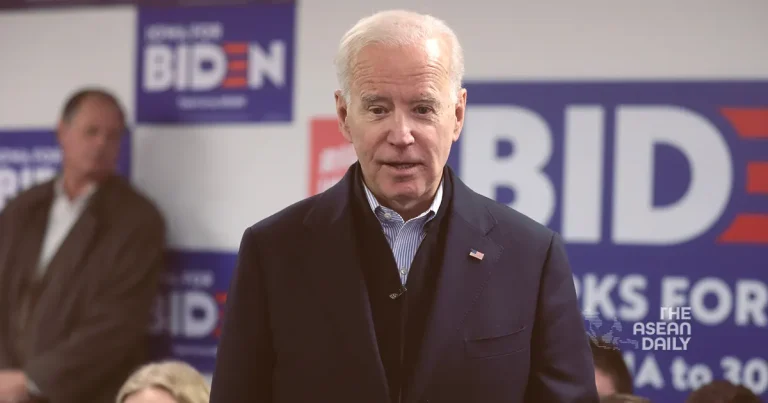15-6-2024 (WASHINGTON) In the high-stakes realm of American politics, the question of cognitive fitness has taken centre stage as President Joe Biden gears up for his reelection bid in the 2024 presidential race. Concerns over his advanced age and perceived memory lapses have cast a long shadow over his candidacy, igniting a fierce debate that has gripped the nation.
The cognitive concerns surrounding President Biden were thrust into the global spotlight during the recent G7 summit in Italy. A widely circulated video captured Biden momentarily wandering away from his fellow world leaders during a group photo, only to be gently guided back by Italian Prime Minister Giorgia Meloni. This perplexing lapse in situational awareness fuelled speculation about the President’s mental acuity on the international stage, prompting diplomatic sources to express concerns about Biden “losing focus” during the crucial gathering.
Everyone freaking out about that Biden clip at G7.
I found the full video. The longer clip, in context, is even more horrifying. pic.twitter.com/obFINP7RNE
— Viva Frei (@thevivafrei) June 13, 2024
Closer to home, Biden’s perceived cognitive lapses have also been on display within the hallowed walls of the White House. During a recent Juneteenth celebration on the White House lawn, the President stood motionless for several seconds, seemingly frozen, as people cheered around him. When he later delivered remarks, Biden stumbled through words and phrases, adding to the mounting concerns over his ability to maintain clarity and coherence in public addresses. These incidents, amplified by the unforgiving glare of the media spotlight, have provided ample fodder for Biden’s critics and raised legitimate questions about the potential impact of cognitive decline on his leadership and decision-making abilities.
Pay close attention to Joe Biden’s hands in this video! pic.twitter.com/C5r0ceTNnX
— Matt Wallace (@MattWallace888) June 12, 2024
At 81 years old, Biden finds himself in uncharted territory, poised to become the oldest president in U.S. history if elected for a second term. This unprecedented feat has fuelled a nationwide debate on the implications of advancing age on cognitive abilities and the potential impact on presidential decision-making.
Recent incidents have only heightened these concerns. From momentary freezes during public events to stumbles over words and dates, Biden’s lapses have been scrutinised under the unforgiving lens of the media and political opponents alike. The revelations from Special Counsel Robert Hur’s investigation into Biden’s handling of classified documents have further amplified these worries, with Hur describing the President as “a sympathetic, well-meaning, elderly man with a poor memory.”
JUST IN: ???????????????? Everyone covers for President Joe Biden after confusingly turning around during an honorary ceremony in France. pic.twitter.com/GtKRZr0hVk
— BRICS News (@BRICSinfo) June 7, 2024
However, as experts in the field of geriatric medicine and cognitive impairment caution, the assessment of cognitive function in older adults is a complex and nuanced endeavour. Dr. Leslie Kernisan, a renowned geriatrician and the founder of Better Health While Ageing, emphasises the multifactorial nature of cognitive decline. “Cognitive impairment in older adults can stem from a wide range of causes, including medication side-effects, metabolic imbalances, hormonal changes, and even underlying neurological conditions,” she explains.
In a comprehensive article on her website, Dr. Kernisan outlines the essential steps healthcare professionals should take when evaluating cognitive impairment in older adults. These include documenting the patient’s and family’s concerns, assessing functional impairment, conducting objective cognitive tests, and ruling out common medical causes and contributors.
“It’s crucial to recognise that cognitive impairment is not an inevitable consequence of ageing,” Dr. Kernisan cautions. “Many older adults maintain sharp cognitive abilities well into their later years. The key is to identify and address any underlying conditions that may be contributing to cognitive difficulties.”
While Biden’s detractors have seized upon these perceived lapses as evidence of his unsuitability for office, his supporters argue that such scrutiny is unfair and perhaps even ageist. They point to the President’s continued vigour and engagement, citing his frequent bike rides and active schedule as indicators of his physical and mental fitness.
Adding fuel to the fire is the looming prospect of a rematch between Biden and his predecessor, Donald Trump, who at 77 years old would also break records as the oldest president ever elected to a first term. While Trump has faced his own share of scrutiny over cognitive lapses and verbal gaffes, public perception seems to weigh more heavily on Biden’s shoulders.
“There’s a clear double standard at play,” asserts a Democratic strategist who requested anonymity. “While both candidates exhibit occasional stumbles, the media and public seem far more fixated on Biden’s age and cognitive abilities. It’s a complex issue influenced by various factors, including media bias and deeply ingrained societal attitudes towards ageing.”
As the 2024 campaign trail heats up, the debate over cognitive fitness and the suitability of older candidates for the nation’s highest office is sure to intensify. Voters will be tasked with navigating a delicate balance between acknowledging the realities of ageing and maintaining an open mind towards the capabilities of seasoned leaders.
“Ultimately, it’s up to the American people to weigh the candidates’ qualifications, experience, and policy platforms alongside any concerns about cognitive abilities,” remarks Dr. Kernisan. “While age should not be dismissed as a factor, it’s crucial to approach this issue with nuance and a commitment to evidence-based evaluation.”




